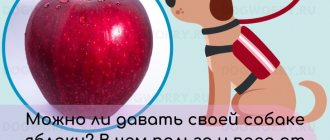Loving owners try to treat their beloved pet with a tasty treat. You should always remember which treats can be given to dogs and which cannot. Many owners try to find out whether dogs can eat tangerines and in what form. You need to be very careful with this product.
Tangerines are a tasty treat that should be given to your dog with caution.
The benefits and harms of citrus fruits in a dog’s diet
Every dog breeder knows why dogs should not eat citrus fruits. Even though these products are not poisonous, they cause severe allergies in animals. In addition, oranges, tangerines and lemons have a strong odor that dogs cannot tolerate.
Citric acid often causes irritation of the digestive tract and even depression of the central nervous system. Other scientists and veterinarians note that it is not so much citric acid that has a negative effect on animals, but sucrose.
However, all experts agree that 1-2 small slices of citrus fruit per day will not harm your dog. It is important not to exceed this dose.
Citrus fruits have many beneficial properties:
- A source of vitamin C - the largest amount is found in oranges, and tangerines contain slightly less.
- Strengthens the immune system, especially during heavy physical activity.
- Contains vitamins A, B1, B2, B6, B9, D, E, K and PP.
- Rich in minerals - sodium, calcium, magnesium, potassium and phosphorus.
- They will become sources of dietary fiber, ash, proteins, fatty acids, thiamine, folates.
The smell of citrus fruits repels dogs, but a couple of tangerine slices will be a great treat.
These fruits often cause allergies in both humans and dogs. Citrus fruits are especially harmful for diseases of the kidneys, liver, pancreas, as well as for diabetes, hormonal disorders and thyroid diseases.
Oranges do not cause as much harm to a dog's health as avocados, grapes and apricots. However, you need to be very careful with citrus fruits and not overfeed your dog with them.
Some citrus fruits, such as oranges, will be especially useful during the period of vitamin deficiency - in spring and autumn.
This will help improve the dog’s health and make his immune system strong and strong. During the winter months, these fruits will protect your pet’s health and help resist diseases. Citrus fruits have a beneficial effect on the heart, blood vessels, brain and muscles of the animal. They are rich in antioxidants, improve blood circulation and cleanse the body of toxins. Interesting fact! Not only the slices themselves are useful for dogs, but also the white fibrous pulp between the slices and the zest.
Oranges are contraindicated for puppies
Is it possible to give tangerines, oranges, lemons to a pet?
If your pet asks for a piece of tangerine, you can treat it. But this treat should be given little by little and no more than once a day.
There is no need to be afraid of an overdose of vitamin C: it easily dissolves in water and is excreted from the body.
Many dog breeders are confident that dogs should not eat foods that their wild relatives, such as wolves, do not eat. Over the millennia that the dog has lived next to humans, it has grown to love many foods from the human diet. Therefore, you can treat a healthy dog with a small slice of tangerine.
In the wild, dogs often eat wheatgrass to cleanse their stomachs, although the grass is inedible to them. Therefore, there is no need to worry if your dog suddenly begins to show increased interest in oranges.
The danger of exotic fruits is that many fruits are treated with harmful chemicals. Fungicides, sulfur dioxide, biphenyl and bromine are especially dangerous. These substances can cause severe poisoning even in humans. It is necessary to choose fruits very carefully, pay attention to their quality and wash them with soap before eating.
When trying to find out whether dogs can eat oranges, the owner must find out if the pet has allergies. If the dog is healthy, you can give him a couple of orange or tangerine slices. If your dog is allergic, it is better to treat him with an apple.
Orange and tangerine peels are not suitable for dogs to eat; on the contrary, they repel animals with their smell.
Important! Fruits for animals should not be sprinkled with sugar.
Fruits are rich in vitamin C, they must first be peeled
Composition of tangerine
What is inside the juicy fruits? In terms of nutrients, the list would be as follows:
- Water.
- Complex of vitamins.
- Minerals.
- Alimentary fiber.
- Proteins, fats and carbohydrates.
- Saccharides.
- Ash.
- Acids.
Some dog owners argue that the main danger is a possible overdose of vitamin C. Ascorbic acid is water-soluble, so excess leaves the body quickly and easily. You should only be concerned if your pet has liver or kidney disease. However, with a single strong abuse, an overdose can still occur.
There is nothing poisonous in tangerine. All of these components are vital for pets. Then where did the myths about the dangers of fruits come from?
Citrus fruits for pregnant women and puppies
During pregnancy and lactation, citrus fruits should not be given to dogs, as the risk of allergies is too high. For the same reason, tangerines are prohibited for puppies. An allergy to citrus fruits is insidious in that it can accumulate in the body. A dog can eat such treats for a long time without health problems, but with the slightest weakening of the immune system, allergies can suddenly appear.
Pregnant and lactating dogs, as well as puppies under 1 year of age, are too weak and vulnerable. They must be protected from any harmful substances and allergens. During this period, it is better to treat your pets with an apple.
Puppies under 7–8 months should not be offered citrus fruits. When the baby grows up, you can treat him to 1 small slice. If he doesn’t like it, you shouldn’t give this product in the future. If the puppy is satisfied, then next time this treat can be given no earlier than after 4-5 days. You should not treat your pet with tangerines too often.
Attention! Many puppies and young dogs have difficulty swallowing fruit. If your pet chokes, he may suffocate. Therefore, you should give your puppy tangerines and other fruits only under supervision.
Help
Treatment is symptomatic. To quickly remove the allergen, sorbents such as Enterosgel or Polysorb are used. In case of an allergic reaction, antihistamine tablets of different generations are used: Suprastin, Zyrtec or Allegra.
In case of Quincke's edema, the dog is urgently injected intramuscularly with prednisolone or suprastin. Next, treatment is prescribed by a veterinarian, usually using diuretics and protease inhibitors.
For gastrointestinal disorders, sorbents are also used. In addition to them, antidiarrheals are prescribed, for example Loperamide. And to maintain the balance of microflora - Vetom 2.1.
Citrus fruits for older dogs
Another vulnerable category of pets are older dogs. In old age, animals often develop stomach problems. Tangerines and other citrus fruits irritate the walls of the stomach and cause digestive problems. Therefore, it is advisable to refuse such treats and not give tangerines to an old dog.
To ensure that an elderly dog receives enough nutrients, it is best to include a canine vitamin and mineral complex in his diet, rather than natural fruits.
Toy breeds should not eat citrus fruits
Content
1. What are the benefits of citrus fruits? 2. Are tangerines harmful to dogs? 3. How much can you give 4. In what form should you give?
Many people associate winter and New Year with the smell of tangerines, and these healthy citrus fruits can be found on the table in every home at this time of year. And it’s not surprising that the pet sits next to us and looks pleadingly into our faces when we eat fruit, stocking up on vitamins. The hand just reaches out to treat its four-legged friend, without even thinking - is it possible to give tangerines to a dog?
In what form and how often should you give treats?
Citrus fruits can be given no more than once a day, preferably not every day. From the time the pet ate the slice, at least 2–4 days should pass.
- Tangerine and orange slices should be given only fresh, not sweetened. Under no circumstances should you add white sugar.
- The slices must be peeled and added to the porridge along with the apple pieces. Giving treats separately is not recommended.
- Occasionally it is allowed to place a slice in water to make natural fresh lemonade.
- You can squeeze the juice out of the fruit, dilute it with water and offer your dog a drink.
- Concentrated juice should not be given.
All treats should make up only 10% of the daily diet. The share of tangerines among fruit delicacies should not exceed 1%. A pet that is overfed with fruits and other treats can become overweight, which can cause many health problems.
After your dog eats a tangerine slice, you need to carefully monitor his well-being over the next few days. If allergies or other health problems occur, these fruits should no longer be given.
It is advisable to give tangerine pieces mixed with apple pieces
What to replace it with?
There are currently many preventative medications designed specifically for dogs. They can replenish supplies of necessary elements without harm to health. The vitamins in them are presented in the most suitable form.
For example, the drug Ester-S has become widespread among dog handlers around the world, thanks to the good results noticeable on different dogs in a short time.
An alternative replacement for citrus fruits can be the use of less aggressive fruits and berries (with less acid content), but still useful in terms of the amount of vitamins. These fruits include:
- apples;
- pears;
- blueberry;
- rose hip;
- currant;
- banana;
- gooseberry;
- melon;
- watermelon.
At the same time, the following are strictly prohibited:
- avocado (causes food poisoning);
- plum, peach, persimmon (strong laxatives);
- pomegranate (due to the high concentration of acids, it leads to perforation of the stomach walls);
- quince (provokes uncontrollable vomiting).
To whom are they contraindicated?
You should always remember the potential dangers of citrus fruits. But there are animals for which these products are strictly contraindicated:
- sick dogs (with any diseases);
- allergy sufferers;
- pregnant women;
- nursing;
- puppies up to 12 months.
Belonging to a particular breed often influences your susceptibility to food allergies. Many owners are interested in whether a Yorkie or a Pomeranian/Chihuahua can have tangerines. No you can not! Miniature decorative dogs suffer from allergies more often than others. Therefore, you should never offer them citrus fruits, even if the pet strongly asks for it.
Shar Peis, Labradors and Bulldogs also have sensitive digestion. Oranges are also contraindicated for them. These fruits can harm animals with any hormonal disorders.
Attention! It is strictly forbidden to give peels and seeds to dogs. These parts of the fruit are not digestible and can cause intestinal obstruction.
Citrus fruits are harmful to pregnant and lactating dogs
Symptoms of eating
Some dogs are so crazy about delicious fruits that they are ready to steal the forbidden fruit without the knowledge of the owner. If the product is washed cleanly and the pet does not have an allergic reaction, nothing bad will happen. Let's look at possible negative reactions.
Allergy
In case of individual intolerance, the reaction will appear within 2 to 48 hours. Most often, ear exudate increases, and the eyes may begin to water. It is also possible that skin reactions may occur, such as redness between the fingers, rashes on the scruff of the neck, along the back line.
In severe cases, Quincke's edema may develop. In a short time after ingestion, the tissues of the muzzle swell greatly, the swelling is visible to the naked eye. The areas most often affected are the areas around the eyes, jowls, tongue and the most dangerous place - the larynx. But it is worth noting that this reaction is extremely rare.
Gastrointestinal disorder
Another form of product intolerance will be manifested by changes in stool. Diarrhea or vomiting may occur.
Do they eat?
Citrus fruits are a source of vitamins. Many dogs refuse an offered piece of meat in order to eat a piece of tasty fruit. Experts recommend reviewing the animal’s diet; it is possible that the pet’s body lacks vitamins and micro-macroelements.
You shouldn't overuse tangerines, even if your dog loves them very much. Fruits contain lemon juice, which negatively affects the digestive system. A dog can easily do without them; tangerines only give satisfaction from eating them.
Got sick
If a dog does not know the limits in eating fruit, then its body may react as follows:
- diarrhea;
- vomit;
- depressed state.
Vitamin C that enters the animal’s body is excreted in the urine very quickly; it does not accumulate. First you need to stop vomiting, and then start fighting diarrhea. The dog will quickly return to normal, just from now on keep citrus fruits away from it.
Is it possible to give juice?
It’s not worth it, natural orange juice is a more concentrated source of sugars and acids, in particular citric acid, and this is not good for the body.
There is one more limitation if you still decide to pamper your pet sometimes with slices of citrus fruits. Dogs should absolutely not be given the peel (the reason is the presence of toxic substances in it, which was mentioned above), seeds and internal partitions of the fruit. They can cause intestinal blockage, which will lead to obstruction and threat to life.
Source











